2019-2020年新人教版英语初中九年级上册Unit 4 导学案.doc
九年级英语导学案Unit4.docx

大木初中导学案累计课时:28主备人:方诗超审核人张泽泉时间:2015.10.26学科英语年级九课题Unit4 I used to be afraid ofthe darkSection B 2a —2b课型阅读课学习冃标1通过短文阅读,来进一步巩固used to be和not-•-any more的用法对比。
2能在语境中理解牛词,掌握他们的基本用法,并能灵活运用学习重点难点重点:掌握Section B 2a-lc所有重点单词,短语和句型。
难点:介词by引导的方式状语的合理运用。
导学过程学法指导【学习目标】1通过短文阅读,來进步巩固used to be和not•••any more的用法对比。
2能在语境中理解生词,掌握他们的基木用法,并能灵活运用。
【学习过程】:一课前预习:(教师寄语:预习感知,有备无患。
)1预习牛词,试着朗读课文。
写下本节课的牛词:2翻译列短语:太忙整天不冉和…聊天根念过丈的日子我的日常化活have so much time go right home3要点导学(预习本课内容,在课本上划出下列句子,并翻译)导学1 cost, pay, spend, take表示花费,你能正确使用吗?尝试总结四个词的用法:练习:He too much time on clothes.他花费太多的时间在衣着I a lot of time with mv friends.我过去常花大量时间跟朋友玩游戏。
He 3 months building the bridge他花费了三个月去建这座桥。
I 10 yuan for the book.我花了10 元买这木书。
It me a dav to read the book.花费take—took spend-spent cost—cost pay—paid 课前独学,完成单词和功能句的练习,为听力活动做好词汇准备。
小组合作学习熟读重点短语和句子,组长检查预习学案,师友互助,能够正确读出短语全班展示答案听录音跟读,老师导学2 I don* t have the time anymore. not...anymore “不再…”,相当于1no moreI __________ time to watch TV _____________ now .(现在我不再有时间看电视)导学3 I hardly ever have time for concerts. hardly adv.几乎不,没有hardly ever很少。
部编RJ人教版PEP新目标 初三九年级英语 上册第一学期秋季(优质导学案)Unit 4 导学案
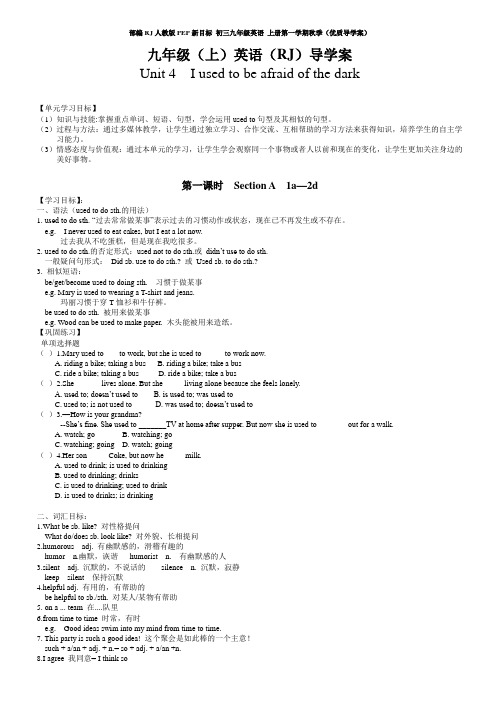
九年级(上)英语(RJ)导学案Unit 4 I used to be afraid of the dark【单元学习目标】(1)知识与技能:掌握重点单词、短语、句型,学会运用used to句型及其相似的句型。
(2)过程与方法:通过多媒体教学,让学生通过独立学习、合作交流、互相帮助的学习方法来获得知识,培养学生的自主学习能力。
(3)情感态度与价值观:通过本单元的学习,让学生学会观察同一个事物或者人以前和现在的变化,让学生更加关注身边的美好事物。
第一课时Section A 1a—2d【学习目标】:一、语法(used to do sth.的用法)1. used to do sth. “过去常常做某事”表示过去的习惯动作或状态,现在已不再发生或不存在。
e.g. I never used to eat cakes, but I eat a lot now.过去我从不吃蛋糕,但是现在我吃很多。
2. used to do sth.的否定形式:used not to do sth.或didn’t use to do sth.一般疑问句形式:Did sb. use to do sth.? 或Used sb. to do sth.?3. 相似短语:be/get/become used to doing sth. 习惯于做某事e.g. Mary is used to wearing a T-shirt and jeans.玛丽习惯于穿T恤衫和牛仔裤。
be used to do sth. 被用来做某事e.g. Wood can be used to make paper. 木头能被用来造纸。
【巩固练习】单项选择题()1.Mary used to ___ to work, but she is used to _____ to work now.A. riding a bike; taking a busB. riding a bike; take a busC. ride a bike; taking a busD. ride a bike; take a bus()2.She ______ lives alone. But she_____ living alone because she feels lonely.A. used to; doesn’t used toB. is used to; was used toC. used to; is not used toD. was used to; doesn’t used to()3.—How is your grandma?--She’s fine. She used to _______TV at home after supper. But now she is used to _______ out for a walk.A. watch; goB. watching; goC. watching; goingD. watch; going()4.Her son _____Coke, but now he _____milk.A. used to drink; is used to drinkingB. used to drinking; drinksC. is used to drinking; used to drinkD. is used to drinks; is drinking二、词汇目标:1.What be sb. like? 对性格提问What do/does sb. look like? 对外貌、长相提问2.humorous adj. 有幽默感的,滑稽有趣的humor n.幽默,诙谐humorist n. 有幽默感的人3.silent adj. 沉默的,不说话的silence n. 沉默,寂静keep silent 保持沉默4.helpful adj. 有用的,有帮助的be helpful to sb./sth. 对某人/某物有帮助5. on a ... team 在....队里6.from time to time 时常,有时e.g. Good ideas swim into my mind from time to time.7. This party is such a good idea! 这个聚会是如此棒的一个主意!such + a/an + adj. + n.= so + adj. + a/an +n.8.I agree 我同意= I think so表示不同意时用I don’t agree 或I disagree9.It’s been three years since we last saw our primary school classmates.自从我们上次小学同学见面以来已经有三年的时间了。
人教版九年级英语第四单元Unit 4 I used to be afraid of the dark 导学案表格式(8课时,40页)
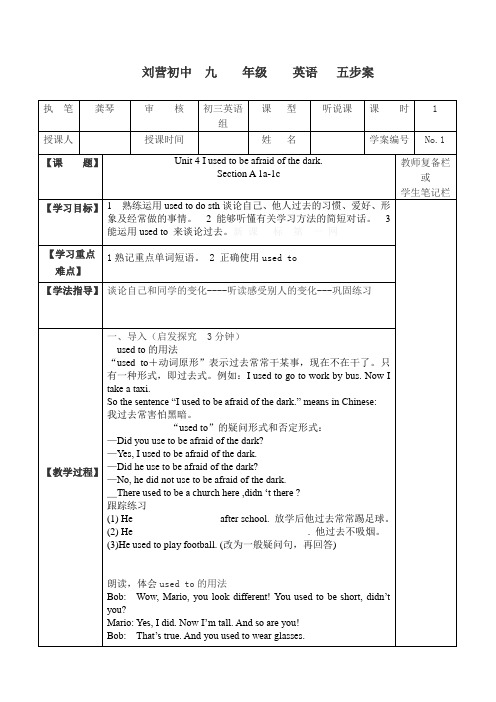
刘营初中九年级英语五步案A.used to drink; is used to drinking B.used to drinking;drinksC.is used to drinking; used to drink D.is used to drink; isdrinking()2.My uncle________ a businessman, but now he is a factoryworker.A.used to being B.was used to beC.use to be D.used to be()3.Betty ________ many friends to play with.A.used to have B.use to haveC.used to having D.use to having()4.Mary used to ____ to work, but she is used to ______ towork now.A.riding a bike; taking a bus B.riding a bike; take a busC.ride a bike; taking a bus D.ride a bike; take a bus阅读短文,完成任务。
When I was young, I was a very naughty boy. But now I am notnaughty any more. I often made trouble which made both my fatherand mother very worried. I liked watching TV all the day and I didn’tlike to go to bed early. I often forgot to do my homework, so myteacher wasn’t happy. But I had a good habit. I liked eating. I didn’tcare what food my parents gave me. I could finish all the f ood I couldsee.根据短文内容,用第三人称完成下列短文When he was young , he 1 naughty .His 2 were3 abouthim .He would 4 all the day watching TV .He didn’t 5early .Hecouldn’t 6 his homework ,so his teacher was 7 withhim .But he had a very good 8 ha bit .He didn’t 9 whatfood his parents gave him .He could eat 10 all the food that hecould see.【教学反思】执笔龚琴审核初三英课型听说课课时 1语组授课人授课时间姓名学案编号No.2How I ‘ve changed!My life has changed a lot in the last few years. I uesd toNow I’mThe biggest change in my life wasThis is the most important change because范文How I ‘ve changed!My life has changed a lot in the last few years. I uesd to be short and shy, but now I am taller and very outgoing . I used to play after scool evry day Now I’m busy with my school work. I used to be afraid of writing composition in class ,but now I love writing all the time.The biggest change in my life was that I didn’t fight with my parents. This is the most important change because I can understand my parents. I talked with them and they let me know I will live a better life if I work hard from now on . In order to study in the university, I must study hard and give up normal life in the past.写作实践五、练评(包含“考点链接”应用探究 6分钟)辨析:used to do sth., be used to (doing) sth. 与be used to do sth.①used to do sth.意为“过去常做某事”,只用于过去时态。
人教版英语九年级上册第四单元作文导学案
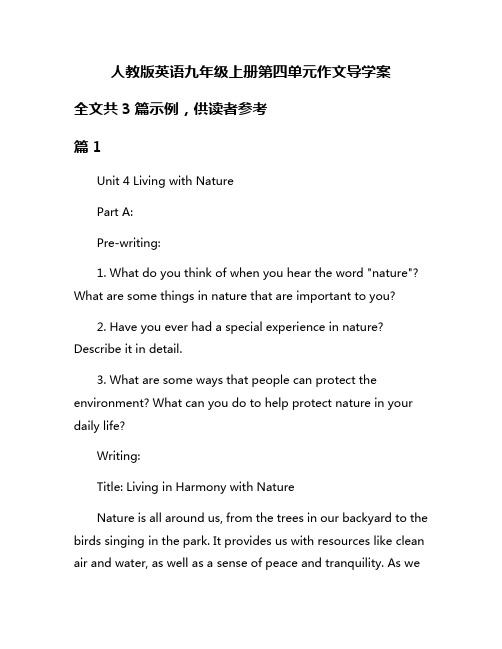
人教版英语九年级上册第四单元作文导学案全文共3篇示例,供读者参考篇1Unit 4 Living with NaturePart A:Pre-writing:1. What do you think of when you hear the word "nature"? What are some things in nature that are important to you?2. Have you ever had a special experience in nature? Describe it in detail.3. What are some ways that people can protect the environment? What can you do to help protect nature in your daily life?Writing:Title: Living in Harmony with NatureNature is all around us, from the trees in our backyard to the birds singing in the park. It provides us with resources like clean air and water, as well as a sense of peace and tranquility. As wego about our daily lives, it's important to remember that we are not separate from nature – we are a part of it. Therefore, it is crucial that we take care of our environment and live in harmony with nature.One of my most memorable experiences in nature was when I went camping in the mountains with my family. We spent a weekend hiking, fishing, and enjoying the stunning views. I remember feeling so connected to the world around me, and it made me realize how important it is to protect the natural world.There are many ways that we can protect the environment and live in harmony with nature. For example, we can reduce, reuse, and recycle our waste to minimize our impact on the planet. We can also plant trees, clean up trash, and support organizations that work to preserve natural habitats. In my daily life, I try to use less plastic, walk or bike instead of driving, and conserve water and energy whenever possible.By taking small steps to protect the environment, we can make a big difference in the world around us. Let's work together to live in harmony with nature and ensure a sustainable future for generations to come.Part B:1. What are some ways that you can protect the environment in your daily life?2. Do you think people are doing enough to protect nature? What more can be done to preserve our natural world?3. How do you feel when you spend time in nature? How does it make you appreciate the world around you?Part C:Peer Review:1. Read your partner's essay and make notes on what you liked about it.2. Offer suggestions for improvement, such as adding more specific details or expanding on certain points.3. Discuss ways that you can work together to protect the environment and live in harmony with nature.篇2Unit 4 Language points (Revision)【目标】1.熟练掌握本单元单词、词组、重点句型、语法。
人教版九年级全一册英语unit 4单元导学案unit 4 a
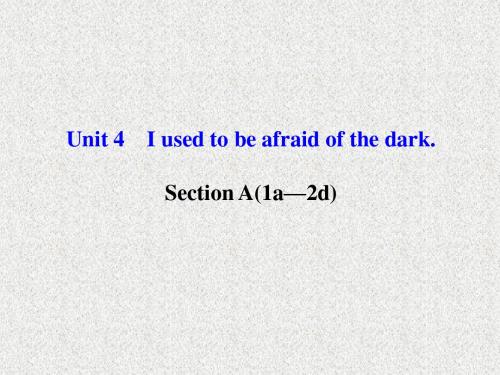
Ⅰ. 单词填写
1. humorous(adj. )
______________
2. score(n. &v. )
______________
3. silence(n. )
→__________ (adj. )沉默的
3. 他过去戴眼镜吗? __________ he__________ __________ wear glasses? 4. 比利的变化是如此的大! Billy has changed__________ __________ ! 答案: 3. Did; use to 4. so much
1. He used to be so shy and quiet. ____________________________ 2. It’s been three years since we last saw our primary school classmates. ____________________________ 答案: 1. used to意为“过去常常”, 后接动词原形, 表示过去的 动作和状态。 2. it’s是it has的缩写, 该句的前半句为现在完成时。
4. help(v. )
→__________ (adj. )有帮助的
答案: 1. 有幽默感的; 滑稽有趣的 2. 得分; 进球
3. silent 4. helpful
Ⅱ. 短语互译
1. 时常; 有时
______________
2. 戴眼镜
______________
3. 对……更感兴趣
______________
九年级英语上册 Unit 4 I used to be afraid of the dark Section B (1a-1e)导学案
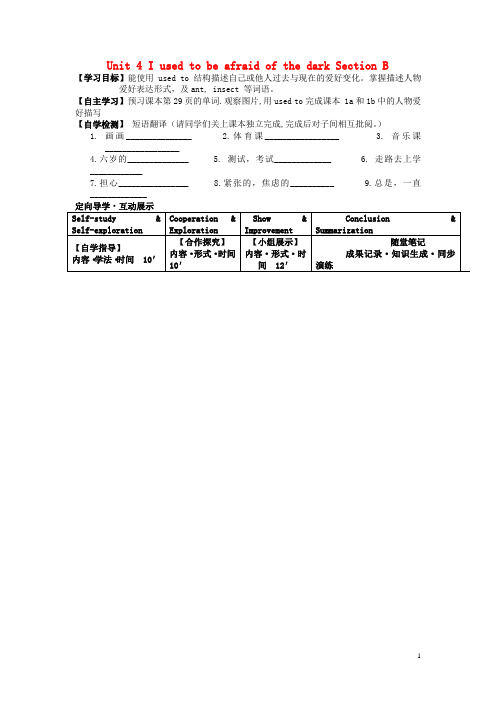
Unit 4 I used to be afraid of the dark Section B【学习目标】能使用used to 结构描述自己或他人过去与现在的爱好变化。
掌握描述人物爱好表达形式,及ant, insect 等词语。
【自主学习】预习课本第29页的单词.观察图片,用used to完成课本 1a和1b中的人物爱好描写【自学检测】短语翻译(请同学们关上课本独立完成,完成后对子间相互批阅。
)1.画画_______________2.体育课_________________3. 音乐课_________________4.六岁的______________5. 测试,考试_____________6. 走路去上学____________7.担心________________ 8.紧张的,焦虑的__________ 9.总是,一直_____________m调跟读并自主核对答至【当堂检测反馈】(3’)根据汉语提示填空完成句子,每空一词 (关上书本,独立完成。
做完后对子间相互批阅。
)1. 我习惯收集蚂蚁和其他昆虫。
I used to collect ______ _____ _____ .2. 我的语文老师过去憎恨体育课。
My Chinese teacher ______ ______ ______ P..E class.3. 他过去常常走路去上学。
He used to ________ ________ _______?4. 李先生过去住在美国,所以习惯吃西餐。
Mr Li ____ _____ ____ in America, so he _____ _____ ______ _______ western dishes.5.过去的日子老板总是要求他的工人工作。
The boss made his boys work _______ _______ _______ in the old days.【拓展提升】1.时间: 10’ 2.训练方式:独立,自主完成自评:师评:批阅日期:___________一、基础题: 用所给词的适当形式填空:1. She used __________(have)straight hair.2.Our teacher looks so _________(worry),What happened?3.I used to be afraid of ___________(speak)in front of a group .4. I have been used to ____________ (live)here.5. His mother makes ____________ (wash)his feet before going to bed.二、发展题:单项选择。
九上u4 welcome U4 Growing up 九年级英语导学案

九年级英语导学案 编制人:刘勇 审核人: 使用日期: 22nd Oct, 20141U4 Growing up班级 小组 姓名 ____________学习目标1. To discuss the ways about how one learns about the world and arouse theSs’ interest in learning this unit.2. To master the important new words, phrases and sentences in thepassage.学习重点:To be able to understand the language points and remember the phrases and sentences.【预习案】A. 根据句意或括号中的中文提示、英文释义,写出句中所缺单词,使句子通顺。
1. ________(时代) are changing and we are changing as well.2. Kitty got the position ________(凭借) her hard work.3. You can come and play badminton _________ (at any time) you want.4.You can search a great ______of information about Kobe Bryant on the Internet.5. ----I’m nervous about it very much. ---- Don ’t let it weigh on your ______.B. grow you worry travel6. .I ’m not really ________about how much it will cost.7. Mr Wang hates________ by air.8. The little girl __________6 inches last year .9. I think you must look after ________ and keep healthy. 【训练案】 一、 句型转换1. He went to bed after he finished his homework.(改为同义句)He______ go to bed _______he finished his homework. 2. I want to build myself another house. (改为同义句)I _______ _______ _______ build _______ _______ _______ _______. 3. The Internet allows us to learn about the world in different times andplaces. (改为被动语态)_______ _______ _______ to learn about the world in different times and places.4. I’m growing too big for my house now.I’m growing too big _______ _______ in my house now.二、 单项选择( ) 1.----What ’s ______ your mind , Kitty? ----I am ________my Maths.A. in; worried aboutB. on ; worried aboutC. on ; worry ofD. in ; worry( ) 2. A great deal of money ____spent on booksA .haveB .hasC .have beenD has been( ) 3. Today the mobile phones are used ________ many ways.A a great deal in B. a great deal on C. a great deal of in D. a great deal of on( ) 4.Anna is going on a tour of Xi ’an, and she wants to ____ Chinese history.A. dream ofB. learn aboutC. look throughD. pass on( ) 5. ________I am in trouble, my best friend Li Lei always helps me.A. WheneverB. WhateverC. HoweverD. Never( ) 6. The headmaster said they ________ library.A. would build anotherB. would build other B. will build another D. will build other( ) 7. ____________________? ----- I’m not feeling very well.A. What ’s outsideB. What ’s in your headC. What ’s upD. What ’s inside( ) 8.Tom doesn ’t go to bed _________he finishes his homework every nightA. afterB. whenC. untilD. because( ) 9. It ’s easy and fast to send and receive e-mails ______ the Internet.A. inB. thoughC. toD. through( ) 10. I’ll go to visit my aunt in England ________ the summer holidays start.A. whileB. sinceC. untilD. as soon as 三、首字母填空A school newspaper The Teens asked over on e thousand teenagers how they spent their spare time. Here they report the r_______ of the survey. It ’s not at all surprising to learn that most teens said they wanted more s_______ time. Most have less than an hour a day for after-school activities.Physical activity was popular among both girls and boys, averaging between three to six hours a week. Favourite sports among girls were tennis, basketball and swimming. Boys said they liked football, basketball and skating.Speaking of entertainment, music and TV were popular. About half of those surveyed said that music was their favourite activity. This i_______ both listening to and playing music. TV was also very popular. Three quarters said they preferred watching TV to reading a book or magazine.Unexpectedly, as many as three out of ten teenagers m_______ that collecting things was something they liked to do in their spare time. They had various collections from cartoon books and baseball cards to stickers, toys and coins.V _______friends was also popular. Eight out of ten teenagers said they met friends once a week. Nine out of ten said they contacted friends through the Internet. A_______ popular way of contacting friends was the telephone. Everyone we surveyed said they spoke to friends every day. Most said they spoke about twenty minutes a day. Surprisingly, teenagers s______went dancing, especially girls. Only one out of ten said they went to the dance regularly.。
人教版最新版九年级英语导学案—Unit-4-I-used-to-be-afraid-of-the-dark
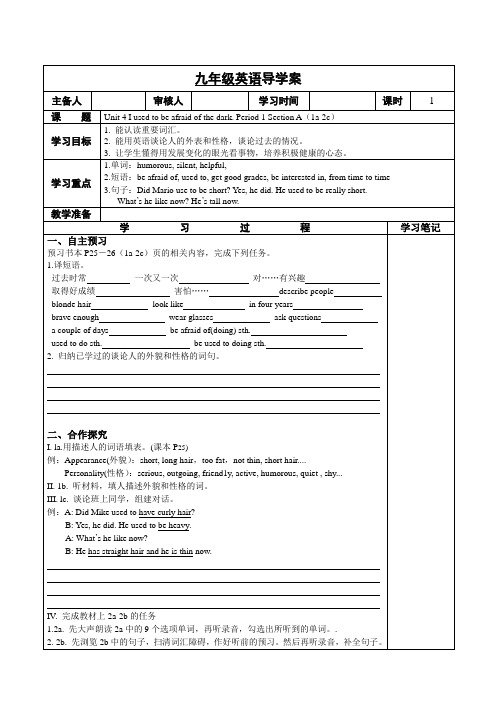
九年级英语导学案主备人审核人学习时间课时 1 课题Unit 4 I used to be afraid of the dark. Period 1 Section A(1a-2c)学习目标1. 能认读重要词汇。
2. 能用英语谈论人的外表和性格,谈论过去的情况。
3. 让学生懂得用发展变化的眼光看事物,培养积极健康的心态。
学习重点1.单词:humorous, silent, helpful,2.短语:be afraid of, used to, get good grades, be interested in, from time to time3.句子:Did Mario use to be short? Yes, he did. He used to be really short.What’s he like now? He’s tall now.教学准备学习过程学习笔记一、自主预习预习书本P25-26(1a-2c)页的相关内容,完成下列任务。
1.译短语。
过去时常一次又一次对……有兴趣取得好成绩害怕……describe peopleblonde hair look like in four yearsbrave enough wear glasses ask questionsa couple of days be afraid of(doing) sth.used to do sth. be used to doing sth.2. 归纳已学过的谈论人的外貌和性格的词句。
二、合作探究I. la.用描述人的词语填表。
(课本P25)例:Appearance(外貌):short, long hair,too fat,not thin, short hair....Personality(性格):serious, outgoing, friend1y, active, humorous, quiet , shy...II. 1b. 听材料,填人描述外貌和性格的词。
- 1、下载文档前请自行甄别文档内容的完整性,平台不提供额外的编辑、内容补充、找答案等附加服务。
- 2、"仅部分预览"的文档,不可在线预览部分如存在完整性等问题,可反馈申请退款(可完整预览的文档不适用该条件!)。
- 3、如文档侵犯您的权益,请联系客服反馈,我们会尽快为您处理(人工客服工作时间:9:00-18:30)。
九年级(上)英语(RJ)导学案Unit 4 I used to be afraid of the dark【单元学习目标】(1)知识与技能:掌握重点单词、短语、句型,学会运用used to句型及其相似的句型。
(2)过程与方法:通过多媒体教学,让学生通过独立学习、合作交流、互相帮助的学习方法来获得知识,培养学生的自主学习能力。
(3)情感态度与价值观:通过本单元的学习,让学生学会观察同一个事物或者人以前和现在的变化,让学生更加关注身边的美好事物。
第一课时Section A 1a—2d【学习目标】:一、语法(used to do sth.的用法)1. used to do sth. “过去常常做某事”表示过去的习惯动作或状态,现在已不再发生或不存在。
e.g. I never used to eat cakes, but I eat a lot now.过去我从不吃蛋糕,但是现在我吃很多。
2. used to do sth.的否定形式:used not to do sth.或didn’t use to do sth.一般疑问句形式:Did sb. use to do sth.? 或Used sb. to do sth.?3. 相似短语:be/get/become used to doing sth. 习惯于做某事e.g. Mary is used to wearing a T-shirt and jeans.玛丽习惯于穿T恤衫和牛仔裤。
be used to do sth. 被用来做某事e.g. Wood can be used to make paper. 木头能被用来造纸。
【巩固练习】单项选择题()1.Mary used to ___ to work, but she is used to _____ to work now.A. riding a bike; taking a busB. riding a bike; take a busC. ride a bike; taking a busD. ride a bike; take a bus()2.She ______ lives alone. But she_____ living alone because she feels lonely.A. used to; doesn’t used toB. is used to; was used toC. used to; is not used toD. was used to; doesn’t used to()3.—How is your grandma?--She’s fine. She used to _______TV at home after supper. But now she is used to _______ out for a walk.A. watch; goB. watching; goC. watching; goingD. watch; going()4.Her son _____Coke, but now he _____milk.A. used to drink; is used to drinkingB. used to drinking; drinksC. is used to drinking; used to drinkD. is used to drinks; is drinking二、词汇目标:1.What be sb. like? 对性格提问What do/does sb. look like? 对外貌、长相提问2.humorous adj. 有幽默感的,滑稽有趣的humor n.幽默,诙谐humorist n. 有幽默感的人3.silent adj. 沉默的,不说话的silence n. 沉默,寂静keep silent 保持沉默4.helpful adj. 有用的,有帮助的be helpful to sb./sth. 对某人/某物有帮助5. on a ... team 在....队里6.from time to time 时常,有时e.g. Good ideas swim into my mind from time to time.7. This party is such a good idea! 这个聚会是如此棒的一个主意!such + a/an + adj. + n.= so + adj. + a/an +n.8.I agree 我同意= I think so表示不同意时用I don’t agree 或I disagree9.It’s been three years since we last saw our primary school classmates.自从我们上次小学同学见面以来已经有三年的时间了。
It’s been +一段时间+since+从句“自从...以来已经有多长时间了”。
还可以表示为“It is +一段时间+since+从句”。
since 此处用作连词,意为“自从,自...以来”。
主句常用完成时态,且动词需用延续性动词。
since 后接从句,该从句用一般过去时态。
10.Yeah, his face always turned red when he talked to girls!是的,当他跟女孩说话时脸总是会变红!* turn“变成”,多用于在颜色或性质等方面的变化,强调变化的结果。
e.g. The leaves turned red and yellow in autumn.become“变得,成为”通常指身份、职位的变化,强调变化的过程已经完成。
e.g. She became an English teacher.*get“变得”,多用于口语,表示一种变化过程,强调“渐渐变得”,其后常接形容词比较级。
e.g. In winter, the days get shorter.11. see sb. doing sth. 看见某人正在做某事see sb. do sth. 看见某人做了某事【学习步骤】:略巩固练习:(一)根据汉语意思完成句子。
1.----艾丽斯是个怎么样的人?-----她很善良和幽默。
----- What _______ Alice _________?----- She is kind and ______________.2.我的老师送给我许多英语方面有用的书。
My teacher _______ me lots of __________ books in English.3.他跑的足够快。
He runs _________ ___________.4.自从我开始学英语已经有5年的时间了。
It _____ ______ five years ______ I _______ _______ learn English.5.我那时看见一些老人正在打中国的太极拳。
I _______ some old people _________ Chinese Taiji.第二课时Section A 3a—4c【学习目标】一、词汇目标:1.interview v.采访,面试interview sb. about sth. 就某事采访某人interview n.采访,面试,访谈give an interview 接受采访2.take up 开始从事,开始做take up doing sth. 开始做某事take up 还可以表示“占去(时间、空间等)”3.deal with= do with“对付、应付、处理”在特殊疑问句中,deal with与how连用,do with与what连用在动词不定式to deal with中,必须带宾语e.g. I don’t know how to deal with it.我不知道如何处理这件事。
4.As she got better, she dared to sing in front of her class, and then for the whole school.当她变得好一点的时候,她敢在全班同学面前唱歌,后来敢为全校同学唱歌。
dare to do sth. “敢于做某事”,其中to 有时可以省略。
5. not.....anymore(any more)= no more “不再”一般表示次数和动作不再重复,多与短暂性动词连用。
e.g. Peter buys a car. He won’t go to work by bike anymore.not......any longer= no longer 表示时间不再延续,多与延续性动词连用e.g. Her father died, and after that she didn’t go to school any longer.6. crowd n.人群,群众v. 拥挤crowded adj.拥挤的7....... but now I get tons of attention everywhere I go. ……但是现在我去哪里都受到极大的关注。
tons of 大量的,许多的= a lot of = lots of8. worry about=be worried about 为……担心,为……烦恼9. hang out 闲逛,闲荡hang--hang--hanghang作动词,还可表示“悬挂”,其过去式和过去分词均为hung.hang up 把……悬挂/挂起10.you have to be prepared to give up your normal life.你必须准备放弃你的正常生活。
prepare v.准备,预备prepared adj.事先准备好的preparation n.准备be prepared to do sth. 准备做某事11.You can never imagine how difficult the road to success is.你想象不到成功的路有多难。
the road to success 成功之路12.You really require a lot of talent and hard work to succeed.你真的需要很多的才艺和努力工作才能取得成功。
require v.“需要,需求” 后可接名词、动词不定式、动名词或that从句作宾语。
e.g. How much money do you require?13.Only a very small number of people make it to the top.只有少数人能出人头地。
